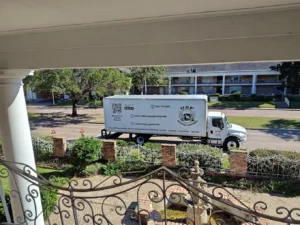Moving across the country is one of the most complex logistical challenges a person can face. The Best transportation mode or method you select is the single largest factor determining your budget, timeline, and stress level. Selecting the right mode ensures a smooth and efficient transition to your new destination.
Choosing the Best Transportation Mode for Your Cross-Country Move
A crucial step in ensuring a successful relocation is finding the best transportation mode tailored to your specific needs. The ideal choice is rarely the same for everyone; it requires balancing three primary trade-offs: cost, control, and convenience. Whether you opt for the hands-on control of driving a rental truck yourself, the flexible scheduling of moving containers, or the maximum convenience of a full-service professional mover, understanding how each mode impacts your budget and timeline is essential for making an informed decision.
Key Factors Influencing Your Transportation Choice
Before committing to a moving method, evaluate these critical factors to ensure your choice aligns with your priorities:
| Factor | Critical Consideration | Rationale for Selection |
| Volume of Belongings | The size of your household (e.g., studio vs. 4-bedroom home). | Small volumes may suit containers or rental trucks; large homes require professional, full-service options. |
| Budget Constraints | The total financial cost, including hidden fees, fuel, and lodging. | Costs vary dramatically: DIY rental trucks are lowest; full-service movers are the highest. |
| Time Sensitivity | The urgency and flexibility of your delivery date. | Driving yourself offers total control; professional services provide delivery windows. |
| Distance and Location | The mileage and accessibility of your residences (narrow streets, apartment floors). | Long distances increase costs for DIY options. Urban areas may restrict container placement. |
| Special Items | Need to transport high-value items, vehicles, or antiques. | Full-service movers offer specialized handling, better insurance, and custom crating. |
Comprehensive Analysis of the Four Primary Moving Modes
The decision often boils down to a trade-off between Cost, Control, and Convenience.
1. Full-Service Moving Company (The Hands-Off Option)
Hiring a licensed interstate mover means they handle everything: loading, driving, and unloading at your destination.
- Pros: Maximum convenience, zero physical labor required, specialty services for fragile items, and best insurance coverage (Full Value Protection).
- Cons: Highest cost (typically 3–5 times more than DIY), less control over the timeline due to delivery windows (e.g., 7–14 days).
2. Rental Truck (The Maximum Control / DIY Option)
You rent the vehicle (U-Haul, Penske, Budget) and are responsible for all packing, loading, driving, fuel, and lodging.
- Pros: Lowest upfront cost, complete control over the schedule and route.
- Cons: Maximum physical effort and stress of driving a large commercial vehicle, high hidden costs (fuel, tolls, required commercial rental insurance).
3. Moving Containers / Portable Storage (The Flexible Option)
Companies like PODS or U-Pack drop off a container; you load it, and they handle the long-haul transportation.
- Pros: Balance of cost and convenience; no driving required; often includes built-in storage (typically 30 days).
- Cons: Mid-range cost, requires adequate street or driveway space for drop-off and pickup, and you must handle all loading/unloading labor.
4. Freight and Rail Moving (The Small Volume Option)
This method involves consolidating your packed household goods onto a pallet or into a reserved section of a commercial truck (LTL freight).
- Pros: Can be extremely budget-friendly for small shipments and is often more eco-friendly.
- Cons: High risk of damage due to sharing space with commercial cargo, and the longest, least flexible transit times.
Comparative Cost and Control
| Feature | Full-Service Mover | Moving Container | Rental Truck (DIY) |
| Typical Cost (3-BR) | $7,000 – $15,000 | $4,000 – $8,000 | $2,500 – $5,000 |
| Labor | Done by the mover | Done by you (or hired labor) | Done by you |
| Schedule Control | Low (Delivery Window) | Medium (Drop-off Window) | High (Total Control) |
| Required License | USDOT / MC Number | USDOT / MC Number | Standard Driver’s License |
Make Your Cross-Country Move Stress-Free with USF Moving Company in Houston
The best transportation mode for your cross-country move depends on your priorities:
- Choose a Full-Service Mover if you prioritize Convenience and the protection of high-value goods, regardless of the higher cost.
- Choose a Rental Truck if you prioritize the Lowest Cost and absolute Control over your timeline, and are willing to handle all the labor.
- Choose a Moving Container if you need a strong balance of Cost and Flexibility, especially if you require short-term storage between homes.
Regardless of the method chosen, careful planning, thorough vetting of the company (especially checking their FMCSA license), and a binding estimate are the keys to a successful, stress-free move.
Conclusion
For those looking for trustworthy and reliable movers in Houston, USF Moving Company stands out as a premier choice. With years of experience and a strong commitment to exceeding customer expectations, our dedicated team offers tailored solutions to simplify your relocation process. Whether you’re moving locally within Houston or across the country, we ensure every detail is handled with care. Contact USF Moving Company today for a personalized quote and to experience a seamless move.
Frequently Asked Questions
How do I verify if a mover is legitimate and licensed?
Every interstate moving company must be registered with the Federal Motor Carrier Safety Administration (FMCSA) and have a unique USDOT Number. Always ask for this number and verify it on the FMCSA’s website. A company that cannot readily provide this number is a major red flag and should be avoided.
What is the difference between a binding and a non-binding estimate?
A Binding Estimate guarantees the price will not change based on the actual weight or volume of your shipment (unless you add more items). A Non-Binding Estimate is an educated guess where the final price can be higher if your goods weigh more than initially projected. Always insist on a binding estimate for financial certainty.
Should I hire a moving broker or a direct carrier?
A Carrier (or Mover) owns the trucks and directly employs the crew handling your items, providing better accountability. A Broker only sells your job and outsources the work to the cheapest available carrier. To avoid miscommunication and potential scams, it is generally recommended to work directly with a licensed carrier.
How far in advance should I book my cross-country move?
It is advisable to book 6 to 8 weeks in advance, especially if you are moving during the peak season (May through September) or need a specific weekend date. Booking early secures your date, locks in pricing, and allows ample time for planning.
Are there any items movers legally cannot transport?
Yes. Reputable movers are legally prohibited from transporting dangerous and hazardous materials, which include: flammable or explosive items (gasoline, propane tanks, paint), corrosive or toxic substances, and perishable foods that require refrigeration. Check your mover’s specific list of non-allowable items.
Should I tip the movers, and if so, how much?
Yes, tipping is customary and highly appreciated in the moving industry. A good guideline is to tip based on the service and the length of the job: $30 – $50 per mover for a full day move, or 15-20% of the total labor cost split among the crew for a successful, complex cross-country relocation.



